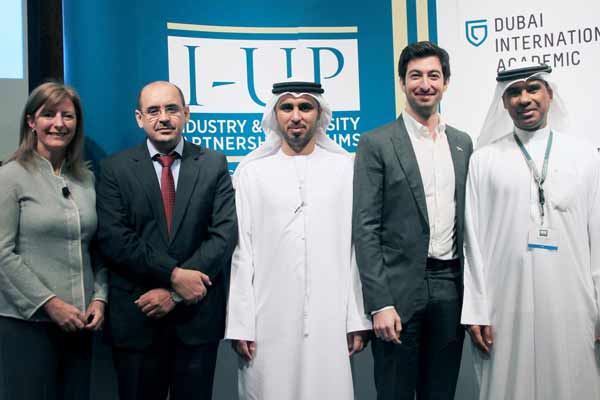
Experts hail Dubai law on student part-time work visa
DUBAI, May 3, 2017
Dubai’s new part-time student work regulation has strengthened the emirate’s reputation as a leading international education hub, experts said.
The regulation is a significant milestone that aligns with the UAE’s Vision 2021, which has articulated the setting up of a competitive knowledge economy. The Student Part-time Work Regulation will ensure a volume of qualified and work-ready young professionals by allowing creative talent to gain critical industry experience to complement their fields of study and increase their employment prospects post-graduation, they felt.
The fifth edition of the Industry and University Partnership Forum (I-UP Forum), hosted by Dubai International Academic City (DIAC) and Dubai Knowledge Park (DKP), gathered leading educators, industry experts and key stakeholders in Dubai to discuss the impact of the new part-time student work regulation issued by Dubai Creative Clusters Authority (DCCA), including ways to strengthen Dubai’s position as an international education hub to a growing transnational student sector.
The forum, an education dialogue titled “The Part Time Student Work Policy – Supporting home grown talent and equipping our youth with the skills to succeed in the work place” was attended by experts and professionals from universities, industries and government departments, including panellists, Mohamed Al Bahri, Chief Officer- Zoning and Commercial Affairs , Dubai Creative Clusters Authority (DCCA); Mohammed Salem, President, University of Wollongong Dubai and Jean Michel Gauthier, CEO, InternsME.
Moderated by Sarah Cocker, managing director, Pinnacle Media, the panellists spoke at length about the new DCCA regulation, its impact on the employment landscape in the region and the importance of collaboration between government, industry and academia to make this initiative a success.
Mohammad Abdullah, managing director of Dubai International Academic City and Dubai Knowledge Park, stated: “As we embark on a journey of empowerment at all levels, we must plan ahead and invest in the right training initiatives to support graduates and develop their skills for the future. Students at DIAC universities can now explore opportunities to work part-time across Tecom Group business communities, home to leading multinational and home-grown companies.
“Several knowledge hubs in North America and Europe already allow students to work while they study. Not only does this initiative further move Dubai towards becoming a global education powerhouse, it is also proof of the UAE’s commitment to transition into an innovative economy by equipping students with the knowledge and skills needed to develop and succeed.”
He added: “Continuous and open dialogue with government, industry and education stakeholders through forums such as I-UP is key in helping us understand how to adapt to the ever-changing demands of regional and global markets while ensuring we advance student success,” he said.
Professor Mohamed Salem, president, University of Wollongong Dubai, highlighted: “The I-UP Forum is a unique platform for engagement between industry leaders and universities and provides valuable insights on needs and new trends in knowledge and skills, opportunities for students and the role of universities as enablers for a knowledge economy. This year’s edition of the I-UP Forum is particularly important with the advent of new regulations in Dubai allowing fulltime students to gain valuable industry experience whilst studying.”
The new regulation has been introduced at a time when studies have proven how work enhances the creative and innovative capacities of young people, qualities that are highly valuable to the creative industries. It has also been validated that youth contribution is a key measure in addition to innovation and labour efficiency that impacts a nation’s competitiveness.
Mohamed Al Bahri, chief officer – zoning and commercial affairs, DCCA, commented: “At Dubai Creative Clusters Authority, we understand that future prosperity lies in the hands of today’s youth. It is critical that we provide opportunities to nurture the creative entrepreneurs of the future.”
The DCCA student part-time student work regulation is a first for the Middle East, giving 26,000 students the opportunity to work part-time across 4,500 businesses located in the Creative Clusters. Motivated and dynamic students who understand the competitiveness of the workplace can now enhance their potential for future success by gaining real-world experience before they graduate.
“The new regulation has the potential to bring about many economic and societal benefits. What is key, however, is the creation of holistic partnerships and strong synergies between government, businesses and universities to maximise its success,” said Al Bahri.
Prior to the establishment of the part-time work regulation, students in Dubai were unable to secure employment while studying, lacking vital workplace experience and skills needed to keep up with the fast-changing job market. By connecting the higher education and industry sectors, the student experience has been enriched through exposure to real-world experiences such as forming professional relationships at an early stage, ultimately increasing their chances of full-time employment after graduation. Most importantly, part-time work inculcates a sense of responsibility and self-reliance, by providing students with the opportunity to support themselves financially. – TradeArabia News Service







